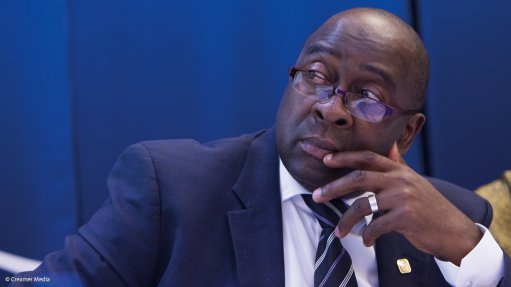
Finance Minister Nhlanhla Nene
Photo by: Duane Daws
Finance Minister Nhlanhla Nene has acknowledged that South Africa requires “much higher levels of economic growth” to address unemployment and poverty. He also stresses that any economic expansion would need to be supported by the accelerated implementation of the structural reforms identified in the National Development Plan (NDP).
Speaking at Deloitte’s post-Budget breakfast on Tuesday, Nene argued that government, business, labour and civil society could speed up these reforms over the period ahead by working more closely together.
The economy expanded by only 1.5% in 2014, it slowest rate of growth since the recession of 2009 and below the already weak 2.3% expansion recorded in 2013.
The immediate outlook was also lacklustre, with the National Treasury projecting that gross domestic product (GDP) would expand by only 2% in 2015, before climbing to 2.4% and 3% in 2016 and 2017 respectively.
Previously, the forecast was for 2.5% growth in 2015, 2.8% in 2016 and 3% in 2017 – all well short of the 5% aspiration set out in the NDP.
“Reforms under way through the medium-term expenditure framework will put our economy on a higher growth path,” Nene argued, pointing in particular to initiatives that promoted energy efficiency and skills development, as well as farming and industrial competitiveness.
The Minister even argued that the 2015 Budget – which confirmed a R25-billion lowering of the expenditure ceiling and R17-billion in tax increases – would reinforce changes under way to place the economy on a more sustainable growth footing.
These interventions included:
- A shift from a growth path reliant on consumption to one led by investment.
- Implementing major investments in backbone infrastructure to enhance productivity.
- Strengthening incentives for tradable sectors with significant potential for job creation and facilitating the transition to a less energy-intensive economy.
- Investing in cities to reverse inequitable and inefficient patterns of human settlement.
- And numerous reforms and regulatory changes, and a strategic review of State-owned entities, to raise long-term growth potential.
Various incentives had been put in place to bolster food processing, downstream manufacturing and energy efficiency.
“Agricultural exports to Europe, and processed food exports to sub-Saharan Africa should also benefit from real effective exchange rate depreciation and growth conditions in these regions.”
Demand for manufactured products, meanwhile, should be stimulated by government procurement initiatives, with the Preferential Procurement Policy Framework Act allowing for the specific designation of products and services that should be sourced from domestic producers.
Nene also stressed that the fiscal consolidation package outline in the Budget would result in national debt stabilising at 44% of GDP in 2017/18.
“Slow economic growth means that the economy does not generate enough tax revenue needed to close the gap between revenue and expenditure. And to continue borrowing more money would jeopardise the sustainability of public finances,” he asserted, noting that interest payments would consume R420.8-billion over the next three years.
“As the custodian of public finances, government must therefore take carefully considered steps to narrow the budget deficit.”